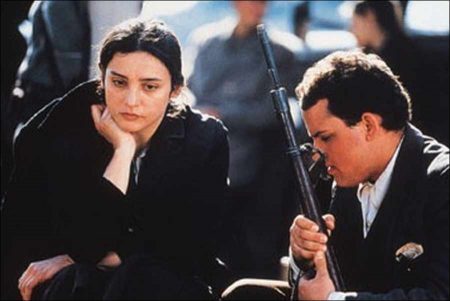Kedma movie storyline. Set seven days before the creation of the state of Israel in May 1948, a small rusted ship, with a group of concentration camp survivors from Shoah, is received at the new territory with open hostility. They are met by British troops, who are shooting at them, and are trying to forbid them from disembarking.
As well, the survivors are met with guns blasts being shot by the Jewish secret army, who has come to help them. Only a small group actually succeeds in landing on the small beach, where they are able to experience their first hours in Palestine. Tired and hungry, the hopeful emigrants have then to follow the Jewish forces to immediately take up arms against the Arabs. Unspoken truths from both sides explode in the violent and tragic conflict.
Kedma is a 2002 Israeli film directed by Amos Gitai and starring Andrei Kashkar, Helena Yaralova, Yussuf Abu-Warda, Moni Moshonov, Juliano Mer-Khamis, Keren Ben Rafael, Gal Altschuler, Sasha Chernichovsky, Dalia Shachaf and Rawda Suleiman. It was entered into the 2002 Cannes Film Festival.
Film Review for Kedma
Following films such as Kadosh and his last Cannes entry Kippur, Kedma is the latest of Amos Gitai’s provocative inquiries into Israeli history and identity. Set in 1948, seven days before the creation of the state of Israel, Kedma proposes a return to historical first principles in examining the issues behind the Middle East’s current crisis. As such, it would seem a dead cert for the most controversial film in the Cannes competition, if it were not such a sober, reserved and formally composed work.
As is quickly apparent in the early scenes with a ramshackle British detachment – seemingly led by an American-accented officer who addresses his troop as “guys” – this is not a realistic historical recreation, but an austerely stylised exercise and more than a little Brechtian. It is primarily a film of figures in landscapes, with individuals periodically emerging to take centre stage and speak their piece.
Kedma’s considerable poise and austere beauty, however, may ultimately dilute its effect as hard political argument. With its concluding plea for Arab-Israeli dialogue, and pessimistic view of Israel as an already-corrupted ideal, Kedma may not make Gitai many friends on the right in his homeland, and still less on commercial distribution circuits. But it stands to have a provocative, if not all-out controversial, presence on the festival scene.
The story follows a boatload of Jewish men and women emigrating from Europe after the Holocaust. On arrival in Palestine, they are promptly inducted by Jewish defence forces into a conflict they do not understand and a stark, hostile terrain that seems anything but the promised “land of dates and almonds” one refugee sings of. On board their ship the Kedma (a word never explained on screen but translated in the press notes as ‘Toward the Orient’), the men and women exchange harrowing stories of their survival and their families’ deaths.
Arriving on the beach, they are met by members of the underground Jewish defence organisation the Palmach, before a detachment of British soldiers move in to arrest them. The new arrivals are split into groups to be guided to a kibbutz, in one case by Klibanov (Moni Moshonov), a gentle, older man with socialist ideals. En route, his group encounters a group of Arabs, who tell him they are fleeing from the Jews; Klibanov replies that his group are fleeing from the British.
After a bloody showdown between Jews and Arabs, the film ends with two matching and equally impassioned laments. One is from Arab father Yussuf (Yussuf Abu Warda), who bitterly protests at the displacement of his community, the other from Polish refugee Janusz (Andrei Kashkar), traumatised by his experience and declaring that Israel is, from its start, already finished as a Jewish utopia.
For all its formal simplicity, Kedma is anything but straightforward – at once violent and visually poetic, impressionistic and polemical, sometimes graceful yet at times awkwardly theatrical. It begins with an elaborate long opening shot that begins with the huddled mass in the ship’s hold, then takes us above deck to look out across an overcast sea. The balletic tone continues when we hit a grey, austere scrubby shore, in a long tracking shot that recalls the grand-scale, quasi-operatic choreography of Theo Angelopoulos’s essays in Greek history – not surprisingly, since Gitai is working here with Angelopoulos’s long-term DoP Yorgos Arvanitis.
As the closing shot of a grey, overcast landscape makes clear, the Jews have left Europe behind geographically, but symbolically and in terms of its legacy hardly at all. As the refugees are armed and trained by the rather glamorous proto-hippie guerillas of the Israeli militia, we learn more about their European experiences and its lasting effects. Chillingly, baby-faced young cantor Menachem (Menachem Lang) declares himself more than ready for battle – “I’ll sow death all around me.”
Gitai soon establishes parallels between the Jews’ exodus from Europe and the displacement of the Arabs in Palestine. Menahem’s fury is echoed by that of Yussuf, who, after the uprooting of his community, forecasts generations of Arab resistance. The film ends with Janusz’s own horrified cri de coeur, in which he calls rhetorically for an end to the teaching of Jewish history, and laments what he sees as the false invocation of Jewish suffering as a foundation of Israeli ideology. The film, clearly, is less a literal recreation of Israel’s early history than an essay on the origins of contemporary hostilities and, in particular, the loss of faith in Israel’s utopian dream.
Kedma (2002)
Directed by: Amos Gitai
Starring: Andrei Kashkar, Helena Yaralova, Yussuf Abu-Warda, Moni Moshonov, Juliano Mer-Khamis, Keren Ben Rafael, Gal Altschuler, Sasha Chernichovsky, Dalia Shachaf, Rawda Suleiman
Screenplay by: Mordechai Goldhecht, Amos Gitai
Production Design by: Eitan Levi
Cinematography by: Giorgos Arvanitis
Film Editing by: Kobi Netanel
Costume Design by: Laura Dinolesko
Art Direction by: Yoav Dahari
Music by: David Darling, Manfred Eicher
MPAA Rating: None.
Distributed by: Kino International (United States), Celluloid Dreams (Worldwide)
Release Date: May 22, 2002
Views: 69






